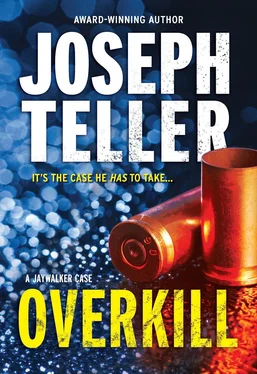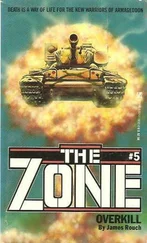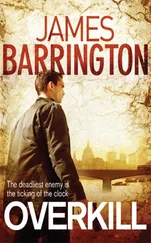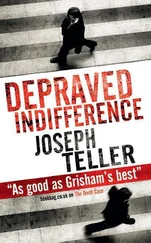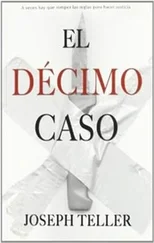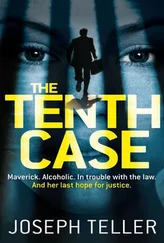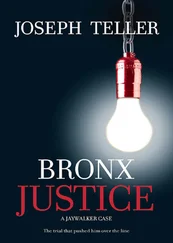Joseph Teller - Overkill
Здесь есть возможность читать онлайн «Joseph Teller - Overkill» — ознакомительный отрывок электронной книги совершенно бесплатно, а после прочтения отрывка купить полную версию. В некоторых случаях можно слушать аудио, скачать через торрент в формате fb2 и присутствует краткое содержание. Жанр: Криминальный детектив, на английском языке. Описание произведения, (предисловие) а так же отзывы посетителей доступны на портале библиотеки ЛибКат.
- Название:Overkill
- Автор:
- Жанр:
- Год:неизвестен
- ISBN:нет данных
- Рейтинг книги:3 / 5. Голосов: 1
-
Избранное:Добавить в избранное
- Отзывы:
-
Ваша оценка:
- 60
- 1
- 2
- 3
- 4
- 5
Overkill: краткое содержание, описание и аннотация
Предлагаем к чтению аннотацию, описание, краткое содержание или предисловие (зависит от того, что написал сам автор книги «Overkill»). Если вы не нашли необходимую информацию о книге — напишите в комментариях, мы постараемся отыскать её.
Overkill — читать онлайн ознакомительный отрывок
Ниже представлен текст книги, разбитый по страницам. Система сохранения места последней прочитанной страницы, позволяет с удобством читать онлайн бесплатно книгу «Overkill», без необходимости каждый раз заново искать на чём Вы остановились. Поставьте закладку, и сможете в любой момент перейти на страницу, на которой закончили чтение.
Интервал:
Закладка:
But if Jaywalker was satisfied with the result of four days’ work, Harold Wexler wasn’t. Ignoring the fact that it was already after five o’clock, he directed the clerk to call the names of twenty more jurors-they were by that time on their fourth panel of seventy-five each-from which they would select four alternates. The clerk sighed, the court officers grumbled, and the stenographer called for someone to relieve her. But Wexler pushed on. He’d promised the lawyers they would have a jury by the close of business that day, and he wasn’t about to let the time or a little grumbling stand in his way.
It was almost nine o’clock by the time Jaywalker got home, time to change his clothes, wash his face, make himself something to eat and grab four hours of sleep. He set his alarm for 3:00 a.m. But he needn’t have; he knew full well he’d be up anyway. Tomorrow was Friday, and he’d have the weekend to recuperate.
Some cases, Jaywalker had long ago learned, were won during pretrial investigation and preparation, which was why he obsessed over those endeavors like no one else. Others cases were won by tactics and strategy, the way a chess match was won, by outplotting your opponent. And some were won by brilliant questioning of the witnesses, whether on direct examination or cross. But this case, Jaywalker was firmly convinced, wasn’t going to be won by any of those things. This case was going to be won by whichever side succeeded in telling the better story. The facts that underpinned that story, to be sure, would come from the mouths of witnesses. But to Jaywalker’s way of thinking, not one of those witnesses-not Teresa Morales, not the medical examiner, not Jeremy’s mother or sister, not even Jeremy himself-would be able to dictate the jury’s verdict. When the evidence was finally in, the winning side wasn’t going to be the one with more witnesses or better exhibits. It was going to be the side whose lawyer had put it all together and told the better story.
For the defense, that story would be divided into two parts. Jaywalker liked to think of them as bookends at the far opposite ends of a shelf. In between them would be everything else: the prosecution’s case, the defense case, the competing accounts of the various witnesses, the physical exhibits, the objections sustained or overruled. But all of that stuff was pretty much predetermined, fixed long ago by what people had seen and heard and photographed and drawn and written down and committed to memory, accurately or not. It might contain a surprise here or there, and an effective direct or cross-examination might enhance or undermine it a bit. But only a bit. Because all that stuff was static, in the sense that it was history. What was different, what was still to be written, was how each lawyer took that raw material and shaped it into a narrative that provided the jurors with a lens to view the case through, until they had a meaningful understanding of not only what had happened, but why it had happened. And with that understanding, they would ultimately either convict Jeremy or acquit him. That was the dynamic part of the case, and that was where Jaywalker was going to win it, if ever he was going to. And Friday would bring with it his first real chance to set his plan in motion. Friday would be the day of his opening statement, the first of the two bookends.
13
The sixteen jurors-twelve regulars and four alternates-were led into the courtroom and seated in the order they’d been selected. Judge Wexler addressed them for twenty minutes, outlining what they should expect over the coming week or two, instructing them on several basic principles of law, and describing both his role in the trial and theirs. Then he called upon Katherine Darcy to open on behalf of the People.
As Jaywalker had by that time fully expected she would, Darcy delivered a coherent, competent opening statement. Barely glancing at her notes, she demonstrated a comfortable command of the facts. She made the obligatory comparison between her opening and the table of contents of a book. She read the indictment, word for word. She outlined what witnesses she would call and, in broad strokes, what each of them would say. Then she told them that once all the evidence was in, she would have another opportunity to address them, at which time she would ask them to find the defendant guilty of murder. With that she sat down, barely fifteen minutes after she’d begun. It was an effective, if understated, opening.
Jaywalker’s would be different.
“It is May,” he began.
Years ago, he’d decided to dispense with the traditional “May it please the court.” And not too long after that, he’d gotten rid of “Ladies and gentlemen of the jury.” The last to go had been “Good morning” and “Good afternoon.” By the time Jeremy Estrada’s trial came around, Jaywalker had settled on launching directly into what had happened from his client’s perspective. What he liked to think of as the narrative opening.
The story.
He began the telling of it with those three little words, “It is May,” speaking them so softly that the jurors were not only forced into immediate and total silence, but were literally compelled to lean forward in their seats in order to hear him. And by standing directly in front of them, without so much as an index card in his hands, he demanded their visual attention, as well. Katherine Darcy had delivered her opening statement behind a lectern, a podium with a slanted top, perfect for placing documents or concealing notes. She’d ventured out from behind it once or twice, but had each time quickly retreated to its safety.
Jaywalker’s distaste for tradition was matched by his disdain of safety. He was about to tell the jurors a story, a story that he knew so well by then that he could have recited it backwards, had he been called upon to do so. He needed no notes, and he wanted no barrier.
Perhaps it was his ego at work, but Jaywalker was convinced that he could tell Jeremy’s story better even than Jeremy himself could. Jeremy’s turn would come, but it wouldn’t come for the better part of two weeks, after all the other witnesses for both sides had had their say. And when it came, it would come in Jeremy’s halting, hesitant way, constantly interrupted by objections and exceptions, sidebar conferences, rulings and recesses. Jaywalker simply couldn’t afford to wait that long for what might prove to be a fractured, fragmented account of the events. He’d decided instead to tell the story from start to finish now, in his own voice. That way, when the jurors eventually heard Jeremy’s account, they would not only have a framework, an overview of what had happened, they’d even be able to fill in the blanks Jeremy would invariably leave with details Jaywalker had already provided them.
“It is May. Perhaps it is even two years ago to this very day. Jeremy Estrada wakes up and gets ready for school. He’s all of seventeen years old. Seventeen. He’s a student, though not a very good one. Part of that is because Jeremy has learning disabilities, and things don’t come easily to him. And part of it is because he also works several part-time jobs after school and on weekends, as he has since the age of fourteen, in order to help out his mother and his sister. There is no father in the home.
“It’s a bright, sun-drenched morning as Jeremy walks down the avenue, his book bag slung over one shoulder. The stores on the avenue are just beginning to open for business. As he passes one of them, a flower shop, some slight movement off to his right catches his attention, and he glances inside. There he sees a young lady, a girl, really, also seventeen years old. And in that moment, in that split second, their eyes meet. And this case begins.”
Читать дальшеИнтервал:
Закладка:
Похожие книги на «Overkill»
Представляем Вашему вниманию похожие книги на «Overkill» списком для выбора. Мы отобрали схожую по названию и смыслу литературу в надежде предоставить читателям больше вариантов отыскать новые, интересные, ещё непрочитанные произведения.
Обсуждение, отзывы о книге «Overkill» и просто собственные мнения читателей. Оставьте ваши комментарии, напишите, что Вы думаете о произведении, его смысле или главных героях. Укажите что конкретно понравилось, а что нет, и почему Вы так считаете.
